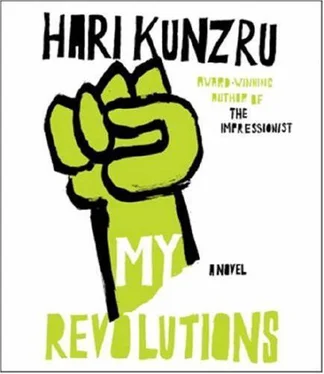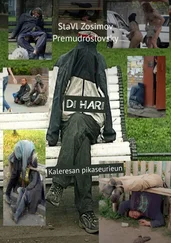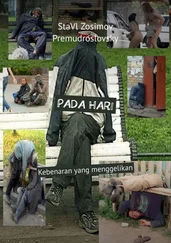Hari Kunzru
My Revolutions
I used to have fiery intensity, and a flowing sweetness.
The waters were illusion.
The flames, made of snow.
Was I dreaming then? Am I awake now?
Rumi
The question of what would have happened if. . is ambiguous, pacifistic, moralistic.
RAF, The Concept of the Urban Guerrilla
Outside in the garden, workmen from the marquee company are bolting together an aluminum frame on the lawn. They shout to each other and make jokes, theatrically throwing bolts and brackets across the blossom-strewn patch of grass under the tree. It’s an old tree, taller than the house, and in autumn the fruit smashes when it falls to the ground. We should, I suppose, have had it cut down. The men seem happy. Maybe it’s because they work in an atmosphere of constant preparty excitement. Perhaps celebration gets inside them. The secret of the good life: putting up tents.
Other people are out there too. Caterers, a delivery driver; all preparing for the big do. Miranda has gone out for something or other, ribbon or flowers or place cards. For once, she said, she wanted me to be the center of attention. She knew I wouldn’t approve, but everyone deserved the chance to wish me a happy fiftieth. Everyone, I thought. Everyone? They’re her friends really, but I knew how kindly it was meant. And I found myself looking forward to my party. For a long time, more than half my life if you want to look at it that way, I’ve avoided large gatherings. It’s become instinctive, part of my personality. However, during the last few years I’ve started to lower my guard, a little. Which “karma-wise” (as Miranda would say, meaninglessly) seems to have been a mistake.
I look away from the window. The study has been transmuted by Miles’s visit. It’s as if, by coming here, he’s put the room in brackets. The oak desk silted with spreadsheets and reports, the shelves of books. Even the chipped gray filing cabinet has taken on a provisional, insubstantial look. The party preparations going on outside, which are, I have no doubt, at the very center of
Miranda’s consciousness, feel to me as if they’re taking place on TV, a scene from one of those early-evening dramas where well-heeled suburbanites experience a little formulaic frisson in their lives; romance or a murder-mystery.
The workmen are laying out a white awning beside the metal frame. I sit very still, not wanting to disturb the atmosphere of the room, the pattern of the life I’ve led in it. Miranda will be back soon. What will I say to her? What can I say?
Voices in the hall. Not Miranda or Sam, not yet. I open the study door and meet two young guys, all gum and hair gel, carrying musical equipment. They ask where it should go and I hear myself give them directions, modulating through a series of cheery cadences. Mein Host the birthday boy, his mask still more or less intact under pressure.
I have to be clear. It’s already over. All this — the house, my family, this ridiculous party — no longer exists. But accepting that doesn’t mean I know what to do next, and even if I choose to do nothing, events will carry on unfolding, and very soon now, days or even hours, my life here will be over. In the sitting room there’s a photo of Miranda, which I took on a cold weekend walk at the Norfolk coast. She’s standing with her back to the camera, looking out to sea. The light is coming straight at the lens, and she’s little more than a silhouette: big boots, narrow shoulders wrapped in an ethnic something-or-other, hair streaming in the wind. Somehow that’s the image that comes to me: frail, romantic Miranda, rather than the arranger of breakfast meetings, the recipient of local chamber- of-commerce awards, the Miranda of the last few years. Soon a wave is going to break over her: police, maybe the media. How will she cope? I wish I could feel optimistic, but Miranda isn’t a person who deals well with the world’s unpredictability. She’s always fought hard against randomness, with all the weapons in the stationer’s: a little arsenal of agendas and diaries and wall-planners dotted with colored stars. Poor Miranda, no amount of Post-its will ward off what’s about to happen to you. You’re utterly unprepared.
The stairs creak as I climb up to the bedroom. I have to duck my head to go through the door. I’ve never found the low ceilings and narrow corridors of country cottages quaint, at least not straightforwardly. They’re scaled to the small stature of poorly nourished people; an architecture of hardship and deprivation. Of course I’ve never said this to Miranda. Irregular walls and creaking floorboards please her. I think she’d like to forget she was born into an industrial society. I can’t, at least not in the same way. That kind of mystification has never seemed right to me. It’s so incoherent, for one thing. A country life, but with plumbing and telecoms and antibiotics. A rich person’s fantasy.
But this is our house, or rather Miranda’s house, the house she allowed me to share and always wanted me to love as she did. I realize I’m standing with my fists clenched, glaring at the William Morris wallpaper, the patchwork cushions on the armchair. Above our bed, hanging from the oak beam, is a dream catcher. I tug at it, breaking the string. I’ve wanted to do that for so long. Such an absurd, out-of-place thing. Our house is filled with these objects— tribal, spiritual, hand-crafted little knick-knacks that are supposed to edge us nearer to Miranda’s wish-fulfillment future of agrarian harmony. There are corn dollies and old glass bottles and prints of medicinal herbs with quotations from Culpeper printed underneath in calligraphic lettering. “Only from lucre of money they cheat you, and tell you it is a kind of tear, or some such like thing, that drops from Poppies when they weep.” That’s outside the bathroom. Culpeper is natural , and natural is the flag Miranda waves at the world, the banner standing for righteousness and truth.
Why am I doing this, breaking her things? None of it’s her fault. She’s worked hard to make the life she wanted. She’s tried to be a good person. And she has loved me. I know what will be the most terrible thing — the look on her face, the gradual opening of the abyss. Everything she has known or believed about me, her lover, her partner for sixteen years, the man who has been a stepfather to her daughter, is untrue. Or if not untrue — for I’ve tried not to tell unnecessary lies — then partial, incomplete.
Listen to me. Partial, incomplete . I’m even lying to myself. It could hardly be worse; she doesn’t even know my real name.
My bowels are loose. I lock myself into the bathroom, among the lavender bunches and embroidered hand towels and the rows of Bountessence products in their little recyclable bottles. Bountessence is the highest expression of Miranda’s romance with nature. Bountessence is Miranda, though in public it’s the two of us, because I still cling to some undefined administrative role and occasionally squire the boss to events and dinners in the West Sussex area. I’m a sort of Denis to her Margaret. Michael Frame and Miranda Martin of Bountessence Natural Beautycare.
It’s peculiar. Those words make no sense to me. I can’t connect myself with them, or with the couple they represent. They’re just sounds. Ever since I became Michael Frame, all those years ago, I’ve existed in a kind of mental crouch. When I was a child I used to have night terrors, not quite dreams, more semiconscious imaginings that took on narrative form, like scenes from films. In one recurrent situation I was wedged under the floorboards, holding my breath and waiting for the German soldiers to stop searching the attic where I was hiding. I could hear the clatter of their boots, a guttural voice barking orders. I used to lie rigid under the covers, the blood pounding in my head, my entire consciousness occupied by the effort of not making a noise. I think when I went underground those night terrors colonized my waking life. Remaining undetected has consumed all my energy, has hollowed out my sense of self. Nothing that has taken place in the meantime has ever quite felt real.
Читать дальше












